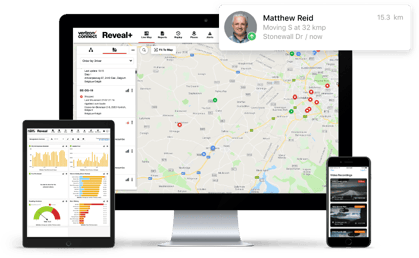How does the construction industry use GPS tracking?
GPS tracking is now an extremely valuable, multi-faceted business tool for the construction industry.
Read more
The Construction industry is key in the global economy. In Europe, this sector employs “more than 24.9 million people” (1) and “provides a value added of EUR 1,158 billion” (9.6% of the EU total)(2).
In the pathway of decarbonisation the role of construction is crucial. From one side, construction contributes to “6.8% of greenhouse gases (GHG) emissions globally” (4) and this involves not only construction but also “renovation, maintenance, and demolition activities”.(5)
From another perspective, construction is one “of the biggest source of Europe’s waste, with 37.5% of the total generated in recent years by mass” (6) and also, the actual substitution of “primary material by reuse and recycling remains low” (7) so if they continue in a business-as-usual scenario, the renovation of buildings alone will consume 918 million tonnes of virgin materials from 2022-2050 (8).
Also, “buildings are also responsible for about 40% of Europe’s energy consumption” (9). So construction company leaders need to focus on improving productivity, efficiency and sustainability to meet not only the carbon neutrality roadmaps but also to help contribute to the competitiveness of their businesses with innovative technologies like asset tracking that can make a huge impact to help improve results.
Let’s dive into how the future of the Construction industry looks like:
One of the main challenges for the Construction industry is to reduce greenhouse gases and technology can help.
In fact, “digital tools can accelerate the green transition at various stages of the life cycle of the works” in the construction sector that “can optimise resource efficiency, simulate energy consumption, and optimize life cycle emissions” (10).
In this sense, fleet management technologies like asset tracking can help reduce CO2 emissions and improve key areas of construction businesses. The large number of heavy diesel-engine equipment involved in the construction industry requires monitoring and a detailed overview of equipment utilization and idling times to be able to improve fuel efficiency, utilization and sustainability.
Just a small reduction on fuel consumption can make a huge difference. According to research, “decreasing one hour idling time of middle-size construction equipment reduces approximately 3.8 Liters fuel consumption and around 6.85 kg CO2 emission production”(11) and that in a large construction plant can help save fuel, reduce emissions and help follow a green roadmap to decarbonise the business.
But not only this, the help of fleet management technologies can impact positively on the business. Our latest survey about Fleet Technology Trends in Europe 2025 revealed that:
51% of users of asset tracking technology in the Construction sector improved sustainability and 26% of surveyed reduced CO2 emissions.
Download the new Advanced Fleet Management for the Construction Industry 2025 and discover how asset tracking technologies are shaping the future of Construction.
Construction sector is one of the most challenging workplaces in terms of safety, with many teams, machinery, vehicles and tools working in the same area. Unfortunately, accidents are common in the construction industry. The latest report of Eurostat revealed that “more than a fifth (22.5 %) of all fatal accidents at work in the EU took place within the construction sector”(12).
Also, Eurostat shared that “the highest incidence of non-fatal accidents at work in the EU was observed in construction, with 3,152 such accidents per 100,000 people employed”(13).
So safety has to be a core pillar for construction companies and raising the bar on safety standards has to be a priority to mitigate the risk of accidents at the workplace and GPS asset tracking technologies can help.
If you wonder how asset tracking can help the construction industry, here are several ways:
Technology can help to be proactive by monitoring daily operations, in near real-time, to remotely accompany your team, and in case of any emergency and eventuality, take action quickly, this is relevant in terms of safety for your team.
Also, by setting geofences, we establish perimeters that can protect others from entering an area while other machinery is working, or an area that is considered hazardous to contribute to a safe work environment.
The innovative technology of asset tracking can impact safety directly. In fact, our latest survey about Fleet Technology Trends in Europe 2025 revealed that:
48% of users of asset tracking technology in the construction industry improved safety.
Download the new Advanced Fleet Management for the Construction Industry 2025 and discover how asset tracking technologies can help transform the construction industry.
Digitalisation of the construction industry is not an option for strong businesses that want to keep a competitive position in the market.
Technologies like GPS asset tracking can help streamline your fleet’s operations, making decisions based on smart data of your assets like monitoring engine hours, see what assets are being used, which ones are unproductive and relocate them in order to help improve productivity, get more out of every workday and avoid unnecessary equipment rentals.
In this sense, GPS asset tracking technology impacts key areas of construction businesses. In fact, the latest survey about Fleet Technology Trends in Europe 2025 revealed that:
69% of users of asset tracking technology in the Construction sector improved equipment and asset utilization and 52% improved efficiency/ productivity for drivers/workers.
Download the Advanced Advanced Fleet Management for the construction Industry 2025 and discover how asset tracking benefits businesses.
Tags: Cost control




Find out how our platform gives you the visibility you need to get more done.
GPS tracking is now an extremely valuable, multi-faceted business tool for the construction industry.
Read moreHow GPS fleet tracking can help streamline your operations
Read moreFind out how fleet management technology is the way forward and what it can do to help your fleet’s efficiency.
Read moreWe surveyed more than 200 fleet managers in Ireland to learn more about the trends and insights within the fleet management...
Read more